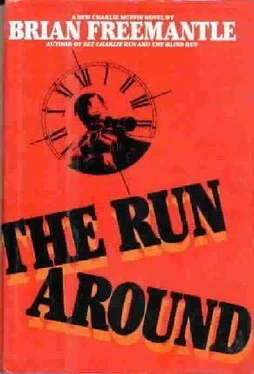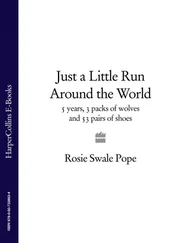Brian Freemantle - The Run Around
Здесь есть возможность читать онлайн «Brian Freemantle - The Run Around» весь текст электронной книги совершенно бесплатно (целиком полную версию без сокращений). В некоторых случаях можно слушать аудио, скачать через торрент в формате fb2 и присутствует краткое содержание. Жанр: Шпионский детектив, на английском языке. Описание произведения, (предисловие) а так же отзывы посетителей доступны на портале библиотеки ЛибКат.
- Название:The Run Around
- Автор:
- Жанр:
- Год:неизвестен
- ISBN:нет данных
- Рейтинг книги:3 / 5. Голосов: 1
-
Избранное:Добавить в избранное
- Отзывы:
-
Ваша оценка:
- 60
- 1
- 2
- 3
- 4
- 5
The Run Around: краткое содержание, описание и аннотация
Предлагаем к чтению аннотацию, описание, краткое содержание или предисловие (зависит от того, что написал сам автор книги «The Run Around»). Если вы не нашли необходимую информацию о книге — напишите в комментариях, мы постараемся отыскать её.
The Run Around — читать онлайн бесплатно полную книгу (весь текст) целиком
Ниже представлен текст книги, разбитый по страницам. Система сохранения места последней прочитанной страницы, позволяет с удобством читать онлайн бесплатно книгу «The Run Around», без необходимости каждый раз заново искать на чём Вы остановились. Поставьте закладку, и сможете в любой момент перейти на страницу, на которой закончили чтение.
Интервал:
Закладка:
‘Looks like it could do with a dusting,’ agreed Donnelly, mildly. As the younger man moved forward from the threshold his foot disturbed a letter among the pile that had built up upon the doormat during Charlie’s absence and Donnelly said sharply: ‘Careful, you careless bugger!’
Ball stopped, just beyond the accumulated mail, and said: ‘What the hell’s wrong now!’
‘Stay there!’ ordered Donnelly. ‘Don’t move for a minute. Just listen. This place looks a shithole and maybe it is but this is going to be the best exercise you’ve been on, from the moment you started to try to learn your trade. An expert lives here, someone who’s forgotten more than it’ll take you to memorize in twenty years. So don’t come your usual arrogant crap. Watch and listen and learn.’
Ball stood in front of the other man, face afire, unable to conceive the idea of another six months of the man. ‘So!’ he demanded.
‘So you’ve already missed something,’ said Donnelly. ‘Two things, in fact. You’ve failed, even before you’ve started.’
Ball swallowed, angry now at himself. Unable to think of anything else, he said: ‘What?’
‘What have we just come through?’ demanded the older man.
Ball sighed. ‘The door,’ he said, patiently.
‘From the outside?’
‘Yes.’ Ball’s tone was curious now.
‘What’s unusual about the inside?’
The younger man looked around for the first time, unable to find the answer. ‘There’s nothing unusual about it,’ he said.
‘Look again.’
‘I am looking, for Christ’s sake!’
‘Not hard enough,’ rebuked Donnelly. ‘Charlie Muffin is a senior officer in British external intelligence, someone who’s worked in security all his life. So where’s his security?’
‘No internal locks,’ realized Ball, at last.
‘No internal locks,’ accepted Donnelly. From inside his jacket he took out four rubber wedges of the sort they always put beneath the door of a burgled room to prevent their discovery if they feared the occupant might return but which both knew would not be necessary today, because of Charlie being in Switzerland. ‘Somewhere — probably in the kitchen — you’ll find a set of these, with which Charlie locks himself in at night. Because he knows like you and I know that the only way to open a door secured by these is to break it off at its hinges, by which time he would be ready. What else does it tell you?’
‘I’m not sure,’ said Ball, more humbled now.
That he’s not bothered about being burgled because there’s nothing here to take. Or more importantly, for us to find.’
‘You mean you aren’t going to bother!’
‘Of course I am going to bother,’ said Donnelly. ‘It’s years since I’ve had a challenge like this. I’m just pointing out the signs to you. And you still haven’t got the second one.’
‘What?’
Donnelly gestured downwards, towards the splayed letters. He said: ‘Which one did you kick?’
‘I don’t know!’
‘You should,’ said the Searcher. ‘Because one — maybe two — of them is a trap and at the moment you’re falling over the edge.’
‘What are you talking about now!’
‘Tell me the date that Charlie Muffin went to Switzerland … went incidentally without even coming back here?’ insisted Donnelly.
‘I don’t know,’ admitted the younger man.
‘You should know,’ lectured Donnelly. ‘It was in the report and it was important. It was the sixteenth.’
‘So?’
‘So get down on your hands and knees,’ ordered Donnelly. ‘The letter you disturbed, incidentally, was the envelope coloured red, the free soap powder offer. But don’t touch that yet. Memorize how every letter is displayed on that mat. And then, one by one, lift it. We’re going to read and photograph every piece that’s there and having examined it all we’re going to put it back precisely as it was. You understand that?’
‘We were always going to do that,’ said Ball. ‘What’s so important about the sixteenth?’
‘The postmark,’ said Donnelly. ‘The first thing you do is study the postmark and not just for the point of despatch. You look for the date. Allow three days for any delay.’
‘I don’t understand!’
‘Anything there prior to the thirteenth will be the snares that Charlie has left,’ warned Donnelly. ‘A trained Searcher can go through mail without trace but if he finds it on the mat the assumption is always that it’s arrived after the occupant has left. So there’s no need to replace it as it supposedly fell. There’ll be at least three envelopes among that pile with dates before the thirteenth: they’re the ones that would tell him we’ve been here.’
‘Bullshit!’
‘You got ten pounds.’
‘Yes.’
‘Put it where your mouth is, against my twenty.’
There were in fact four. It took them an hour to go through, using the method in which a split piece of bamboo is slipped sideways inside the flap and the contents slowly wound up like a tiny blind, to be extracted without the flap being unsealed. As he handed over his twenty pounds Ball said: ‘Seems I’m not the only one who’s a bad gambler.’
The repeated demands from Charlie’s bookmaker were two of the uppermost letters. Donnelly said: ‘Three hundred quid isn’t the end of the world.’
‘It is if you haven’t got it,’ said Ball.
‘That’s all there is though,’ reminded the older man.
Ball straightened gratefully from his squatting position on the floor and said: ‘What now?’
‘Don’t relax,’ advised Donnelly. ‘What about that table, for example?’
It was in the centre of the room into which the front door directly led. Beyond it was the television set and pulled close was an easy chair, the seat sagging, the cushions indented from the last person to occupy it. The table had an obvious flap in its top, the lid to some space beneath, and on that flap was a glass serving as a vase for a single flower, a long-dead tulip that had shed its petals in a haphazard pattern around the base. The water in the glass was dark brown with prolonged use. There was a half-empty bottle of Islay malt, the top still off, and a small residue in the bottom of the type of glass handed out at service stations for buying a required amount of petrol. There were two plates. Upon one was a half-eaten piece of bread, beginning to mildew, and on the other the congealed remnants of a fried meal, rock-hard yellow of an egg yolk and the rind of some bacon. There was also something black and solid, which could have been the remains of some mushrooms. The knife and fork were left as they had been put down, discarded across the plate in a rough cross.
‘How on earth can someone live like this!’ exclaimed Ball.
‘You’d be a fool to think he does,’ warned Donnelly. ‘Look at the chair, for instance.’
‘What about it?’
‘There’s no way a human body could make the indentation in the seat as well as in the cushion like that, not at the same time,’ pointed out the Searcher. ‘It’s another trap. If you lifted the cushion, to see if anything were hidden beneath — which is what we’ve got to do, somehow — the indentation would be disturbed. Just as it would in the cushion, if you looked carelessly beneath that.’
‘Yes,’ agreed Ball, with doubtful acceptance. ‘It would, wouldn’t it?’
‘What about the flower?’
Ball sniggered a laugh. ‘Just a dead tulip.’
‘Nothing strike you as unusual about the petals?’
Ball took a long time, before finally shaking his head.
‘Count them,’ instructed Donnelly. ‘There are forty, including the five still actually attached to the stem, On your way to work tomorrow go into a florist’s and ask the name of the tulip with that many petals. It’s another trap, laddie. We’ve got to look to see what’s inside that table and again the temptation would be to imagine he would not know how the petals lay, having been away for some time. He’s put at least ten in specific, memorized spots.’
Читать дальшеИнтервал:
Закладка:
Похожие книги на «The Run Around»
Представляем Вашему вниманию похожие книги на «The Run Around» списком для выбора. Мы отобрали схожую по названию и смыслу литературу в надежде предоставить читателям больше вариантов отыскать новые, интересные, ещё непрочитанные произведения.
Обсуждение, отзывы о книге «The Run Around» и просто собственные мнения читателей. Оставьте ваши комментарии, напишите, что Вы думаете о произведении, его смысле или главных героях. Укажите что конкретно понравилось, а что нет, и почему Вы так считаете.












